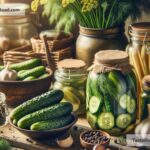Why Dill Is Essential in Pickling
Pickling is one of the oldest ways to preserve food. It’s a process that transforms vegetables, fruits, or even some proteins into tangy, flavorful additions to your meal. While vinegar, salt, and sugar are the building blocks for pickling, there’s one ingredient that’s considered a superstar in this process—dill. Whether you’re enjoying dill pickles, adding chopped dill pickles to potato salad, or snacking on slices straight from the jar, dill plays a central role in giving pickles their distinct taste.
In this article, we’re going to talk about why dill is so important in pickling and why this humble herb has become a favorite for generations of pickle lovers.
What Is Dill?
Dill is an herb that looks a little like wispy green thread. Its feathery leaves, known as dill weed, are bright green and have a mild, slightly sweet taste. It’s more than just decorative—it’s fragrant and flavorful, with hints of citrus, grass, and a subtle anise-like quality. Dill weed is commonly used fresh or dried in a variety of recipes, but its unique flavor really shines in pickling.
Aside from the leaves, dill seeds are also widely used in cooking and pickling. Dill seeds have a stronger flavor than the leaves. They are warm, earthy, and slightly bitter, making them perfect for adding a deeper dimension to brine solutions.
Why Dill Is Perfect for Pickling
Dill is often synonymous with pickles. When people think of pickles, they envision the crunchy cucumbers infused with the fresh, herbaceous flavor of dill. But what makes dill so essential in this process? Here’s why it works so well:
-
Authentic Pickle Flavor
Dill gives pickles their classic, unmistakable taste. It has a light, bright flavor that pairs beautifully with the tanginess of vinegar. Without dill, the flavor profile of a pickle would be more plain and one-dimensional. Dill adds complexity so that every bite becomes a burst of flavor. -
Enhances Aromatics
Dill’s strong aroma plays an important role in making pickles appetizing. Smell is a big part of taste, so adding dill creates a sensory experience. The herb’s fragrant oils blend with the other ingredients in the brine, like garlic, mustard seeds, or peppercorns, to create a well-rounded flavor. -
Balances Acidity
Vinegar is the main ingredient in pickling brine, and it makes pickles sour. Dill acts as a counterbalance to this sharp acidity by introducing fresh and slightly sweet notes. This helps pickles taste complex and refreshing instead of just sour. -
Versatile Flavor Pairing
Not all pickles are made from cucumbers—some popular pickled foods include carrots, beans, cauliflower, and even eggs. Dill is a versatile herb that pairs well with a variety of ingredients. Its ability to complement other vegetables and spices makes it a favorite choice for pickling recipes.
Dill’s Role in Pickling Brine
Pickling brine is the liquid mixture that turns fresh produce into pickles. It usually consists of water, vinegar, salt, and spices. Dill can be added to the brine in one of two forms: fresh dill weed or dried dill seeds.
-
Fresh Dill Weed
Fresh dill weed is primarily used to make dill pickles, but it works well in any type of pickling. The fresh herb adds a bright, green flavor to the brine that soaks into the vegetables. You might see sprigs of fresh dill floating in jars of pickles, which adds visual appeal and extra flavor. -
Dill Seeds
Dill seeds are more concentrated in flavor than fresh dill weed, which makes them ideal for pickling brines where a bold flavor is desired. The seeds infuse the brine with their warm and earthy taste. Often, both fresh dill weed and dill seeds are used together to give pickles a full-bodied flavor.
Beyond Flavor: Dill’s Preservation Role
While dill is primarily used for its flavor, it also plays a small role in the preservation process. Dill contains natural oils and compounds that may help the brine maintain its freshness. Historically, herbs like dill were used not just for their taste but also for their potential to ward off spoilage during long-term storage. That’s part of what made dill an ideal herb for pickling back when refrigeration wasn’t available.
How Dill Elevates Pickling
Without dill, pickles wouldn’t be the same. Dill transforms briny cucumbers and other veggies into zesty snacks that we can’t get enough of. Its fresh, tangy, and aromatic qualities enhance the taste and turn something simple into something special. There’s a reason why dill pickles are one of the most popular types of pickles worldwide—they’re bursting with flavor, thanks to this amazing herb.
Conclusion
Dill is essential in pickling because of its authentic flavor, aromatic qualities, versatility, and ability to balance vinegar’s acidity. Whether you’re using fresh dill or dried dill seeds, this herb is a crucial part of the pickling process. It has been loved for centuries, and it continues to make pickles one of the most flavorful preserved foods you can enjoy.
So, the next time you bite into a crunchy dill pickle, take a moment to thank dill for adding that extra zing that makes pickles irresistible!


